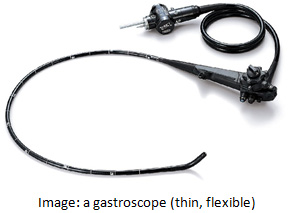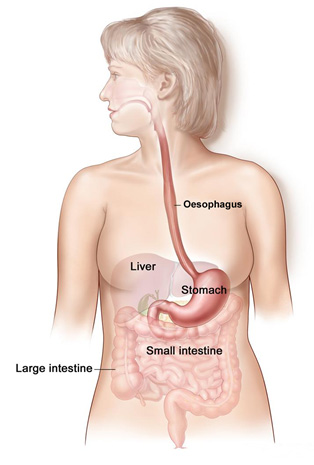Gastroscopy
The procedure is also sometimes referred to as an upper gastro-intestinal endoscopy. An endoscope has a light and a camera at one end. The camera sends images of the inside of your body to a television monitor to help your gastroenterologist diagnose common problems affecting the oesophagus (gullet), the stomach and parts of the small bowel.
WHAT IS A GASTROSCOPY ?
AM I AWAKE DURING GASTROSCOPY ?
In Australia, patients undergoing gastroscopy will be sedated. Patients are therefore not in pain, and are not awake during the procedure. The procedure is usually done as a day-case patient in a specialised endoscopy centre.
WHEN IS A GASTROSCOPY NEEDED ?

Your family doctor may recommend a gastroscopy if you have symptoms such as recurring indigestion, recurring heartburn, pains in the upper abdomen, repeated vomiting, difficulty swallowing, or other symptoms thought to be coming from the upper gut. The sort of conditions which can be confirmed (or ruled out) include:
- Oesophagitis (inflammation of the oesophagus). The gastroenterologist will see areas of redness on the lining of the oesophagus.
- Duodenal and stomach ulcers. An ulcer looks like a small, red crater on the inside lining of the duodenum or stomach.
- Duodenitis and gastritis (inflammation of the duodenum and stomach).
- Cancer of the stomach and oesophagus.
- Various other rare conditions.
A gastroscopy can also be used to treat various gut-related problems. Tiny tools can be passed down the endoscope to:
- repair bleeding ulcers and veins
- widen a blocked oesophagus (the tube through which food passes to the stomach)
- provide nutrition if you’re unable to eat food in the normal way
- remove non-cancerous growths (polyps) or early-stage cancerous tumours
WHAT HAPPENS DURING A GASTROSCOPY ?
A gastroscopy can take about 20-30 minutes. It’s usually carried out as a day procedure, which means that you won’t have to spend the night in hospital. The procedure is often carried out under sedation. You will be very drowsy and have little awareness about what’s happening.
On admission, you’ll meet the nurse before the procedure and they’ll be able to answer any questions you have. You should remove any glasses, contact lenses and false teeth. Your anaesthetist and gastroenterologist will hold conversations with you before the procedure to go through your medical history and to answer any questions you may have.
You will then be guided to go to the endoscopy suite, where the anaesthetist will insert the cannula so that sedative medicine can be given. A nurse will help you to lie on your left-hand side, and a small probe is attached to your finger. This measures your oxygen level and heart rate. You will be asked to bite on a small plastic mouthpiece to help keep your mouth open. This will also help to protect your teeth during the test. Dentures may have to be removed if they are loose. During the test you may be given oxygen through little prongs that fit just inside your nostrils.
After being sedated, your gastroenterologist carrying out the procedure will place the endoscope in the back of your mouth. It will then be guided down your oesophagus and into your stomach.
WHAT PREPARATION DO I NEED TO DO ?
You should get instructions from our office before your test. The instructions will include:
- You should not eat for 6 hours before the test as the stomach needs to be empty.
- You will be sedated, and thus you will need somebody to take and accompany you home.
- Advice about medications which may need to be stopped before the test.
WHAT CAN I EXPECT AFTER A GASTROSCOPY ?
Most people are ready to go home after resting for an hour or so, enough time for the anaesthetic to wear off. You must not drive home or operate machinery for 24 hours after having the sedative. You will need somebody to accompany you home and to stay with you until the effects have fully worn off. Most people are able to resume normal activities the next morning.
When your family or friend arrives to pick you up, your gastroenterologist will go through the findings and give you a report. A copy of the endoscopy report will also be sent to your family doctor. Depending on the results, your gastroenterologist will simply reassure you that there is no concerning findings; or if you need to see your family doctor; or to return to see your specialist if needed (you will need to make an appointment before you leave the endoscopy centre).
You may feel bloated if some air remains in your stomach. It is advisable to sit upright and if possible walk around to help relieve this. Warm drinks and peppermints will also help you to pass the wind. You may have a sore throat, which can last up to 48 hours. Taking throat lozenges will help. You should contact our office if you have persistent pain or vomiting.
You can make bookings, or for further information, please call our receptionist team on 5973 4444 (Mornington) or 5986 4444 (Rosebud).

